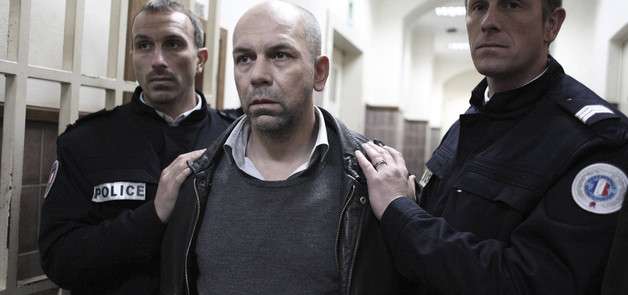 PHILIPPE TORRETON IN GUILTY Intense victim-based docudrama of a judicial nightmare
PHILIPPE TORRETON IN GUILTY Intense victim-based docudrama of a judicial nightmareThe first sixteen minutes of this film,
Guilty/Presumé coupable ("Presumed Guilty"), alone are devastating. It is hard for anything afterward to live up to them. Philippe Torreton is nominated for the César for Best Actor for his performance as Alain Marécaux, a hard-working bailiff, who with his wife and a dozen other people was the victim in 2001 of one of the worst judicial errors in modern France. They were accused completely falsely of being members of a ring of pedophiles guilty of horrific crimes. The judicial and police system is singularly brutal here. What we see in thos opening minutes is Alain and his family having their house invaded in the early morning, being rapidly and brutally taken away by smirking cops, handcuffed, interrogated, threatened, and treated as a sick maniac. It turns out this is the now notorious Outreau affair, and 17 were accused, of whom only four, who were those who accued the others, were ever proven guilty. A overview of the events of the case will be found on
French Wikipedia. It took five years for this to be concluded, and some, including Marécaux, spent most of this time in prison. He lost everything, including his job, his family, and his reputation. He attempted suicide several times and went on a hunger strike.
Unfortunately this precipitous opening is a hint of the whole approach, which is too direct and humorless. A bit of detachment is needed to make anything more than mere pseudo-documentary out of the story. The constant in-your-face hand-held focus on Torreton emphasizes his anguish and suffering and the injustice of the whole affair, but limits the picture given of what is a complex social, political, and legal matter. We get that Maréceaux knew nothing about all this and was innocent and that this was a nightmare for him. But how did all this come about? What are the forces behind the miscarriage of justice? What happened to the principle of presumed innocence? Who stands to gain? Choosing to focus unwaveringly on the judicial victim proved to be a tactical error.
We are left to draw our own conclusions. Some of them are obvious. The public loses its perspective completely in the case of sex crimes, particularly of a pedophile nature. False allegations of pedophile rings also came up repeatedly in the US as well. These may be the witch trials of modern times. But Garenq's film sheds little light on this process. The kind of ambiguity we find in
Capturing the Friedman's is missing, and instead of being troubled and stimulated, the viewer feels bludgeoned over the head repeatedly for 102 minutes. Material that should be the cause of reflection is not. Due to the drawn-out nature of the judicial nightmare, datelines might have helped. What is made clear in the final court proceedings is that the young investigating judge (
juge d'instruction) responsible for all this suffering does get exposed, even though his superiors defend him. Years later Marécaux is able to resume his duties as bailiff, finally exonerated.
In order to manifest his character's physical and psychological suffering in prison, Torreton, an experienced stage actor with many roles for the Comédie Française and other companies to his credit, lost over fifty pounds. His performance is a dedicated one otherwise as well, and it is for this that one watches
Guilty. Torreton excels at showing the humiliation, anger, depression and gradual degeneration of this humble servant of the law as he suffers the effect of his unjust incarceration. We must bear in mind that in this he stands for the many, because there were 17 accused.
What this account shows is that as in American cases, children are coerced by suggestive questions to make false statements and a collection of rumors and accusations builds up. The involvement of Maréch aux's own son recalls the Friedman case.
Guilty opened in Paris September 7, 2011 and received generally favorable reviews from the more mainstream publications. Others expressed the same reservations I have, but all note Torreton's dedicated performance. It was also shown at Toronto, London, and Montreal. The film is part of the joint Film Society of Lincoln Center-UniFrance Rendez-Vous with French Cinema of March 1-11, 2012, and public screenings are as follows:
Mon., March 5, 6:15pm – WRT; Tues., March 6, 1:30pm – WRT; Thurs., March 8, 10:25pm – IFC




